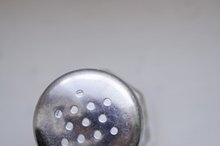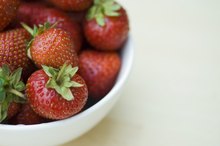What Foods Not to Eat to Avoid High Potassium Levels
A low-potassium diet helps prevent potassium levels in the blood from becoming too high, according to the Ohio State University Medical Center. When your blood potassium levels become too high, you may experience muscle weakness or an irregular heartbeat. Patients with heart conditions or impaired kidneys may need a low-potassium diet to control high potassium levels. Knowing what foods not to eat to avoid high potassium levels can help you keep potassium levels in check.
Meats, Beans and Seeds
While many lean meats are safe on a low-potassium diet, certain meats, beans and seeds should be avoided, according to the Cleveland Clinic. To avoid high potassium levels, do not eat canned, salted or preserved meats like hot dogs, sausage, anchovies or sandwich spreads. You may eat bacon in moderation as long as it contains no added salt. Also avoid dried beans and peas as well as sunflower seeds.
- While many lean meats are safe on a low-potassium diet, certain meats, beans and seeds should be avoided, according to the Cleveland Clinic.
- To avoid high potassium levels, do not eat canned, salted or preserved meats like hot dogs, sausage, anchovies or sandwich spreads.
Fruits and Vegetables
Foods to Lower Potassium Levels
Learn More
To minimize potassium in fruits and vegetables, all fruits and vegetables should be rinsed and drained well before eating, according to Greenwich Hospital. Cook vegetables in water to remove excess potassium and drain well. Vegetables to avoid include avocado, tomato, potatoes including sweet potatoes or yams, pumpkin, Swiss chard, cooked spinach and Brussels sprouts. Most fruits are safe on a low-potassium diet, but according the the Cleveland Clinic you should avoid bananas, strawberries and citrus fruits like oranges and grapefruit.
- To minimize potassium in fruits and vegetables, all fruits and vegetables should be rinsed and drained well before eating, according to Greenwich Hospital.
- Most fruits are safe on a low-potassium diet, but according the the Cleveland Clinic you should avoid bananas, strawberries and citrus fruits like oranges and grapefruit.
Snacks and Sweets
Certain snacks and sweets should be avoided entirely if you are on a low-potassium diet, according to the Ohio State University Medical Center. They also report that you should avoid candy or beverages that contain chocolate, all types of nuts, and any food item containing molasses as these foods are quite high in potassium and may cause high potassium levels.
Related Articles
References
- Cleveland Clinic: Potassium Guidelines for Patients With Heart Failure
- Arnold R, Pianta TJ, Pussell BA, et al. Randomized, Controlled Trial of the Effect of Dietary Potassium Restriction on Nerve Function in CKD. Clinical Journal of the American Society of Nephrology. 2017;12(10):1569-1577. doi:10.2215/cjn.00670117
- A to Z Health Guide. Potassium and Your CKD Diet. National Kidney Foundation. Published November 2, 2018.
- National Institutes of Health Office of Dietary Supplements - Potassium. Nih.gov. Published 2017.
- Raebel MA. Hyperkalemia Associated with Use of Angiotensin-Converting Enzyme Inhibitors and Angiotensin Receptor Blockers. Cardiovascular Therapeutics. 2011;30(3):e156-e166. doi:10.1111/j.1755-5922.2010.00258.x
- St-Jules DE, Goldfarb DS, Sevick MA. Nutrient Non-equivalence: Does Restricting High-Potassium Plant Foods Help to Prevent Hyperkalemia in Hemodialysis Patients? Journal of Renal Nutrition. 2016;26(5):282-287. doi:10.1053/j.jrn.2016.02.005
Writer Bio
A.L. Kennedy is a professional grant writer and nonprofit consultant. She has been writing and editing for various nonfiction publications since 2004. Her work includes various articles on nonprofit law, human resources, health and fitness for both print and online publications. She has a Bachelor of Arts from the University of South Alabama.









